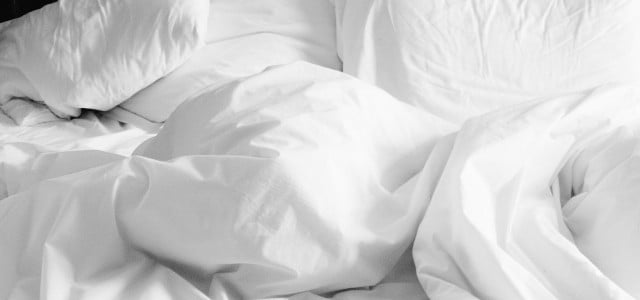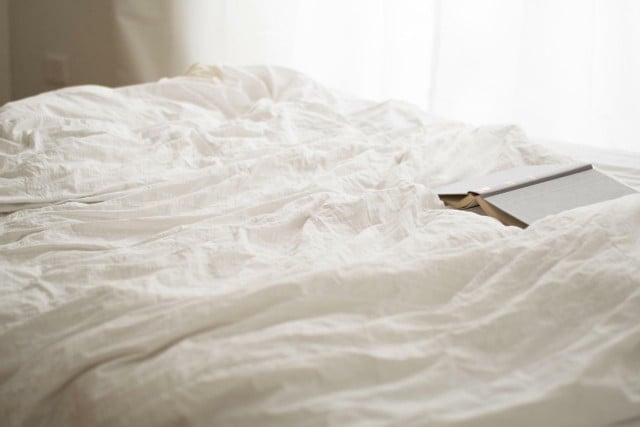
Sleeping naked is said to help you fall asleep better and strengthen your immune system, among other things. You can find out here whether these assumptions are correct and what other effects sleeping naked has on your body.
Some swear by it, others feel disgust and disgust at the idea – sleeping naked is a controversial subject. Of course, this is also due to the fact that everyone has different preferences and needs when it comes to sleeping.
In fact, however, there is scientific evidence that sleeping naked has some benefits.
Sleeping Naked: More Sleep and Better Relationships?
Whether your sleep quality improves when you sleep naked depends on the external conditions. Generally, when we get tired, our body temperature drops. This effect also lasts during sleep. This is due to the so-called “sleep hormone” melatonin, which our body releases at the beginning of the night.
If, on the other hand, we perceive higher temperatures during the night due to warm pajamas or hot ambient air, this can influence our sleeping rhythm. Because both aspects can cause our body temperature to rise slightly and thus cause us to wake up more often.
So skipping your pajamas and sleeping naked may help you fall asleep and stay asleep better. So far, however, there are no scientific results that would clearly prove this connection.
Sleeping naked is also said to have a positive impact on our mental well-being and romantic relationships. Because if you sleep naked next to your partner and have physical contact, your body releases the hormone oxytocin. This can help us feel less anxiety and stress. In addition, the hormone may also make couples feel more emotionally connected because it influences attachment behavior.
Sleeping Naked: The Cons

(Photo: CC0 / Pixabay / LUM3N)
Some people refuse to sleep naked because they find it unhygienic. That’s not entirely wrong either: if you leave off your pajamas, the sweat you sweat at night ends up directly on the bed sheet. Especially if you sweat a lot at night, you should change the sheets more often. The sleep researcher Dr. Hans-Günter Weeß even advises changing the sheets once or twice a week in this case. If you sweat a lot, this also applies to pajamas. However, this takes up less space in the washing machine and is much less complicated to wash.
In addition, sleeping naked can also cause you to freeze faster during the night. According to Weeß, our body is more prone to sweating or freezing, especially in the REM phase. If you are not covered properly or do not have sufficiently warm duvets, you may catch a cold. It is therefore not true that we strengthen our immune system when we sleep naked.
Tips for sleeping without pajamas
If you want to try sleeping naked, here are a few tips to keep in mind:
- If possible, make sure the ambient temperature is right. This is between 18 and 21 degrees Celsius.
- Especially on colder days you should make sure that your duvet is warm enough. Also, consider putting an extra blanket next to your bed in case you get cold at night.
- To minimize the sweat secreted at night, you can take a short shower in the evening.
- Of course, if you have to wash more sheets because of sleeping naked, your water and energy consumption will also increase due to the more frequent washing. So make sure you have multiple sheets and bedding sets. This way you can collect dirty sheets and clean them in one big wash instead of running the washer for just one or two sheets. You can also follow the tips in this article for environmentally friendly laundry: Washing laundry properly: sorting, temperature, detergent.
- If you are initially uncomfortable sleeping completely naked, you can leave out your pajama bottoms or just sleep in your underwear. You slowly get used to the feeling.
- However, do not force yourself to do anything! After a few tries, you realize that you just prefer to sleep in pajamas or a T-shirt? Then listen to your feelings. For a good night’s sleep, it is most important that you feel comfortable.
- It doesn’t matter whether it’s pajamas or bed linen – if possible, look out for products made from natural, organic materials, such as organic cotton or linen. Synthetic fibers, on the other hand, are based on environmentally harmful petroleum and smell more like sweat. You can find inspiration for bed linen made from natural fibers here: Organic bed linen: The most beautiful sustainable bed linen sets.
Read more on Techzle.com:
- Sleeping in the heat: 12 mistakes and how to avoid them
- Sleep healthy: sustainable mattresses, duvets & Co.
- When do babies sleep through? – Good news